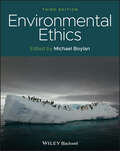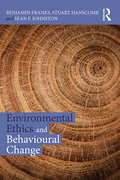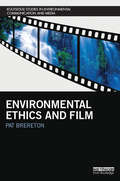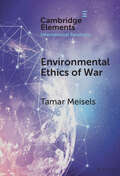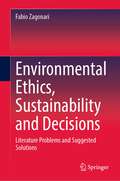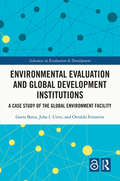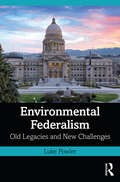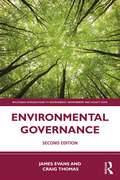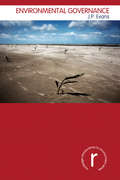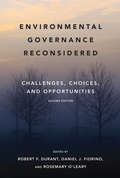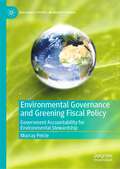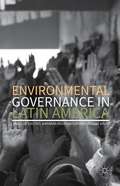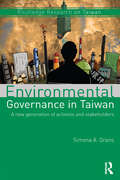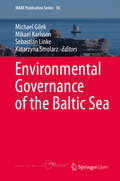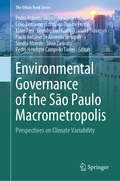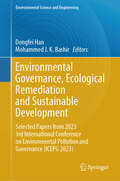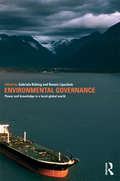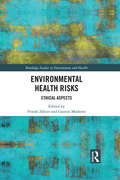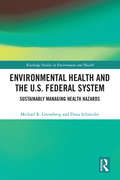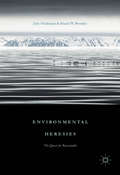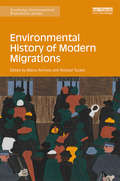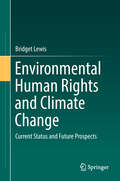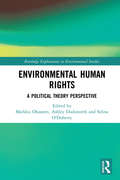- Table View
- List View
Environmental Ethics
by Michael BoylanThe latest edition of an essential resource in the theory and applications of environmental ethics In the newly revised Third Edition of Environmental Ethics, internationally renowned philosopher Michael Boylan delivers another accessible introduction for students new to ethics, and an invaluable reference for scholars of all levels. The anthology includes important essays, both established and contemporary, as well as eight brand-new contributions commissioned specifically for this edition. This new material is the foundation for students# understanding of the most recent ethical debates on the environment and humanity's place within it. The balanced combination of new material on recent developments in the field and well-known, foundational articles appears alongside helpful pedagogical materials, including case studies and sample questions. The book brings students up to speed on all the main themes in the area, including worldview arguments for environmentalism, the anthropocentric vs. biocentric debate, and a variety of applied environmental problems. Environmental Ethics also offers: A thorough introduction to the theoretical background of environmental ethics, including discussions of ethical reasoning, nature, and the tragedy of the commons Comprehensive explorations of eco-feminism and social justice, aesthetics, and deep ecology Practical discussions of anthropocentric and biocentric justifications in environmental ethics In-depth examinations of applied environmental problems, including climate change, animal rights, sustainability, and public policy Perfect for undergraduate and graduate students studying topics in ethics, the environment, law, and policy, Environmental Ethics will also earn a place in the libraries of philosophers with an interest in applied or environmental ethics, and industry consultants to ecologists, environmental scientists, or environmental policymakers.
Environmental Ethics and Behavioural Change
by Sean F. Johnston Stuart Hanscomb Benjamin FranksEnvironmental Ethics and Behavioural Change takes a practical approach to environmental ethics with a focus on its transformative potential for students, professionals, policy makers, activists, and concerned citizens. Proposed solutions to issues such as climate change, resource depletion and accelerating extinctions have included technological fixes, national and international regulation and social marketing. This volume examines the ethical features of a range of communication strategies and technological, political and economic methods for promoting ecologically responsible practice in the face of these crises. The central concern of the book is environmental behaviour change: inspiring, informing and catalysing reflective change in the reader, and in their ability to influence others. By making clear the forms of environmental ethics that exist, and what each implies in terms of individual and social change, the reader will be better able to formulate, commit to, articulate and promote a coherent position on how to understand and engage with environmental issues. This is an essential companion to environmental ethics and philosophy courses as well as a great resource for professionals interested in practical approaches to environmental ethics. It is also excellent supplementary reading for environmental studies, environmental politics and sustainable consumption courses.
Environmental Ethics and Film (Routledge Studies in Environmental Communication and Media)
by Pat BreretonEnvironmental ethics presents and defends a systematic and comprehensive account of the moral relation between human beings and their natural environment and assumes that human behaviour toward the natural world can and is governed by moral norms. In contemporary society, film has provided a powerful instrument for the moulding of such ethical attitudes. Through a close examination of the medium, Environmental Ethics and Film explores how historical ethical values can be re-imagined and re-constituted for more contemporary audiences. Building on an extensive back-catalogue of eco-film analysis, the author focuses on a diverse selection of contemporary films which target audiences’ ethical sensibilities in very different ways. Each chapter focuses on at least three close readings of films and documentaries, examining a wide range of environmental issues as they are illustrated across contemporary Hollywood films. This book is an invaluable resource for students and scholars of environmental communication, film studies, media and cultural studies, environmental philosophy and ethics.
Environmental Ethics of War (Elements in International Relations)
by Tamar MeiselsWar is bad for nature, yet relatively little attention has been devoted to environmental military ethics by just war theorists and philosophers of war. Most wars since 1945 have been civil conflicts, often in areas containing the greatest biodiversity. Combining environmental ethics with ethics of war, this Element examines how the environmental crisis should challenge and change the rules of war. While environmental wartime regulation has been addressed rarely by just war theorists, environmental jus ad bellum has hardly been tackled at all. Can environmental harm trigger a new justification for war? Can targeting nature constitute terrorism? And what would be a proportionate response to 'environmental aggression'? With global degradation and climate change right around the corner, this Element discusses some of the most pressing practical ethics issues of our times, suggesting that grave environmental transgressions should be combatted by measures that do not themselves cause disproportionate harm to nature.
Environmental Ethics, Sustainability and Decisions: Literature Problems and Suggested Solutions
by Fabio ZagonariThis book provides a summary of the main concepts involved in environmental ethics, sustainability and decisions and a consistent sequence of environmental ethics, sustainability and decisions. It presents many environmental ethics, by focusing on maximising welfare within teleological approaches and minimising inequalities within deontological approaches. It presents many sustainability paradigms, by focusing on weak sustainability to maximise welfare and strong sustainability to minimise inequalities. Two main decisions are presented by focusing on policies (taxes, standards, subsidies, permits, protected areas, exploitation rights) and projects (CBA) towards efficiency to maximise welfare and policies (national laws/regulations, bilateral/multilateral agreements) and projects (MCA) towards equity to minimise inequalities.
Environmental Evaluation and Global Development Institutions: A Case Study of the Global Environment Facility (Advances in Evaluation & Development)
by Juha I. Uitto Osvaldo N. Feinstein Geeta BatraEvaluation is increasingly important for finding sustainable solutions for the people and the planet, based on a systematic analysis of what works, for whom, and under what circumstances, and to contribute to the achievement of the Sustainable Development Goals, as they pertain to the environment. This book explores why the Global Environment Facility (GEF) invests in evaluation for accountability and learning to inform its decision-making on programming priorities, and how this leads to wiser funding decisions and better program performance on the ground. The book is based on real-life experiences of how to make evaluation count for international environmental action. Drawing upon comprehensive evaluations of the GEF, it provides unique insights from authors responsible for designing, implementing, and disseminating the findings of the evaluations. No other multilateral development or environment agency places evaluation fully at the center of their decision-making. The book outlines the trends in the global environment and the changing landscape of international environmental finance. It defines the role of the GEF and explains its institutional framework and the unique partnership that involves donor and recipient countries, multilateral development banks, UN agencies, nongovernmental organizations (NGOs), and national agencies in the developing countries. Further, it provides useful pointers to other organizations wishing to enhance evidence-based decision-making for improving their relevance, performance, and impact. The book will be most suitable for graduate-level, specialized study in a variety of disciplines such as environmental and development economics, political science, international relations, geography, sociology, and social anthropology.
Environmental Federalism: Old Legacies and New Challenges
by Luke FowlerIn Environmental Federalism, Luke Fowler helps to refocus much-needed attention on the role of state governments in environmental policy creation and implementation in the United States. While the national government receives most of the attention when it comes to environmental policy, state governments play a vital role in protecting our natural resources. Legacy problems, like air, water, and land pollution, present one set of challenges for environmental federalism, but new problems emerging as a result of climate change further test the bounds of federal institutions. Examining patterns of pollution and case studies from the Clean Air Act and the Clean Water Act, Fowler explores two questions: has environmental federalism worked in managing legacy environmental problems, and can it work to manage climate change? In order to answer these questions, Fowler extends James Lester’s typology using political incentives and administrative capacities to identify four types of states (progressive, delayers, strugglers, and regressives) and assesses how they are linked to the success of federal environmental programs and conf licts in intergovernmental relations. He then considers what lessons we can learn from these programs and whether those lessons can help us better understand climate policy and multi-level institutions for environmental governance. This timely read will be a valuable contribution to students, researchers, and scholars of political science, public policy, public administration, and environmental studies.
Environmental Governance (Routledge Introductions to Environment: Environment and Society Texts)
by Craig Thomas James EvansClimate change is prompting an unprecedented questioning of the fundamental bases upon which society is founded. Businesses claim that technology can save the environment, while politicians champion the role of international environmental agreements to secure global action. Economists suggest that we should pay developing countries not to destroy their forests, while environmentalists question whether we can solve ecological problems with the same thinking that created them. As the process of steering society, governance has a critical role to play in coordinating these disparate voices and securing collective action to achieve a more sustainable future. Environmental Governance is the only book to discuss the first principles of governance, while also providing a critical overview of the wide-ranging theories and approaches that underpin policy and practice today. It places governance within its wider political context to explore how the environment is controlled, manipulated, regulated and contested by a range of actors and institutions. This book shows how network and market governance have shaped current approaches to environmental issues, while also introducing approaches such as transition management and adaptive governance. In so doing, it highlights the strengths and weaknesses of the different approaches currently in play, and considers their political implications. This second edition has been comprehensively updated to build upon the success of the acclaimed first edition, with a new chapter on the environmental governance of outer space and updated analysis of international climate change summits. It provides a ground-breaking overview of dominant and emerging approaches of environmental governance, forging critical links between them. Each chapter has been updated with new case studies, key debates and figures, and includes questions for discussion and further reading. It is essential reading for students of the environment, politics and sociology, and, indeed, anyone concerned with changing society to secure a more sustainable future.
Environmental Governance (Routledge Introductions to Environment: Environment and Society Texts)
by J. P. EvansClimate change is prompting an unprecedented questioning of the fundamental bases upon which society is founded. Businesses claim that technology can save the environment, while politicians champion the role of international environmental agreements to secure global action. Economists suggest that we should pay developing countries not to destroy their forests, while environmentalists question whether we can solve ecological problems with the same thinking that created them. As the process of steering society, governance has a critical role to play in coordinating these disparate voices and securing collective action to achieve a more sustainable future. Environmental Governance is the only book to discuss the first principles of governance, while also providing a critical overview of the wide ranging theories and approaches that underpin policy and practice today. It places governance within its wider political context to explore how the environment is controlled, manipulated, regulated, and contested by a range of actors and institutions. This book shows how network and market governance have shaped current approaches to environmental issues, while also introducing emerging approaches such as transition management and adaptive governance. In so doing, it highlights the strengths and weaknesses of the different approaches currently in play, and considers their political implications. This text provides a groundbreaking overview of dominant and emerging approaches of environmental governance, drawing on cutting edge debates and forging critical links between them. Each chapter is complemented by case studies, key debates, questions for discussion and further reading. It is essential reading for students of the environment, politics and sociology, and, indeed, anyone concerned with changing society to secure a more sustainable future.
Environmental Governance Reconsidered, second edition: Challenges, Choices, and Opportunities (American and Comparative Environmental Policy)
by Robert F. Durant Rosemary O'Leary Daniel J. FiorinoKey topics in the ongoing evolution of environmental governance, with new and updated material.This survey of current issues and controversies in environmental policy and management is unique in its thematic mix, broad coverage of key debates, and in-depth analysis. The contributing authors, all distinguished scholars or practitioners, offer a comprehensive examination of key topics in the continuing evolution of environmental governance, with perspectives from public policy, public administration, political science, international relations, sustainability theory, environmental economics, risk analysis, and democratic theory.The second edition of this popular reader has been thoroughly revised, with updated coverage and new topics. The emphasis has shifted from sustainability to include sustainable cities, from domestic civic environmentalism to global civil society, and from global interdependence to the evolution of institutions of global environmental governance. A general focus on devolution of authority in the United States has been sharpened to address the specifics of contested federalism and fracking, and the treatment of flexibility now explores the specifics of regulatory innovation and change. New chapters join original topics such as environmental justice and collaboration and conflict resolution to address highly salient and timely topics: energy security; risk assessment, communication, and technology innovation; regulation-by-revelation; and retrospective regulatory analysis.The topics are organized and integrated by the book's “3R” framework: reconceptualizing governance to reflect ecological risks and interdependencies better, reconnecting with stakeholders, and reframing administrative rationality. Extensive cross-references pull the chapters together. A broad reference list enables readers to pursue topics further.Contributors Regina S. Axelrod, Robert F. Durant, Kirk Emerson, Daniel J. Fiorino, Anne J. Kantel, David M. Konisky, Michael E. Kraft, Jennifer Kuzma, Richard Morgenstern, Tina Nabatchi, Rosemary O'Leary, Barry Rabe, Walter A. Rosenbaum, Stacy D. VanDeveer, Paul Wapner
Environmental Governance and Greening Fiscal Policy: Government Accountability for Environmental Stewardship (Palgrave Studies in Impact Finance)
by Murray PetrieThis book addresses the increasingly urgent question: How can governments be made more accountable for the quality of their environmental stewardship?It explores:Enhanced national State of the Environment reporting and integration of environmental outcomes in key national indicators.Mainstreaming environmental goals, targets, and risks by integrating them in fiscal policy and the annual budget—a government’s most important policy instrument.Promoting sustainability by progressively exposing and eliminating harmful tax and expenditure policies, putting a price on pollution, and providing environmental public goods.Civil society environmental monitoring.The book combines in-depth assessment of the latest climate/green budgeting literature and country practices with discussion of how to implement green fiscal policies. The framework is deliberately ambitious given the severity, scale, and urgency of climate change and biodiversity loss. The book will be of interest to ministry of finance, budget, and planning officials, to environment sector agencies, oversight institutions, international organizations, civil society organizations, and to academics and students in the fields of environmental studies, development studies, economics, public finance, and public policy.
Environmental Governance in Latin America
by Barbara Hogenboom Michiel Baud F�bio CastroThe multiple purposes of nature – livelihood for communities, revenues for states, commodities for companies, and biodiversity for conservationists – have turned environmental governance in Latin America into a highly contested arena. In such a resource-rich region, unequal power relations, conflicting priorities, and trade-offs among multiple goals have led to a myriad of contrasting initiatives that are reshaping social relations and rural territories. This edited collection addresses these tensions by unpacking environmental governance as a complex process of formulating and contesting values, procedures and practices shaping the access, control and use of natural resources. Contributors from various fields address the challenges, limitations, and possibilities for a more sustainable, equal, and fair development. In this book, environmental governance is seen as an overarching concept defining the dynamic and multi-layered repertoire of society-nature interactions, where images of nature and discourses on the use of natural resources are mediated by contextual processes at multiple scales.
Environmental Governance in Taiwan: A New Generation of Activists and Stakeholders (Routledge Research on Taiwan Series)
by Simona A. GranoThree decades of rapid industrialization until the lifting of martial law in 1987, with little or no concern for the environment, have made Taiwan’s environmental degradation a serious problem. In the past twenty years, Taiwan has seen a surge of environmental organizations, which to a certain degree have enjoyed a remarkable success in fighting polluting industries or affecting policies on behalf of the environment. This book aims to analyse environmental governance mechanisms and actors in Taiwan through a multi-disciplinary research approach. Based on extensive and original research, it includes four different case studies, which have all taken place since 2011. It focuses on four major elements of governance - specifically norms, actors, processes, and outcomes - to examine Taiwan’s national and local environmental governance in the post-2008 period. The book shows how the painful lessons Taiwan has learned throughout its transition should be of interest to other developing countries, illustrating how these positive transformations have managed to bring about a more ecologically friendly mode of economic development. Demonstrating that the battle to further ecological sustainability is also a battle to further democratisation, this book will be of interest to students and scholars of Taiwan Studies, Developmental Studies and Environmental Studies.
Environmental Governance of the Baltic Sea
by Mikael Karlsson Michael Gilek Sebastian Linke Katarzyna SmolarzThis edited volume presents a comprehensive and coherent interdisciplinary analysis of challenges and possibilities for sustainable governance of the Baltic Sea ecosystem by combining knowledge and approaches from natural and social sciences. Focusing on the Ecosystem Approach to Management (EAM) and associated multi-level, multi-sector and multi-actor challenges, the book provides up-to-date descriptions and analyses of environmental governance structures and processes at the macro-regional Baltic Sea level. Organised in two parts, Part 1 presents in-depth case studies of environmental governance practices and challenges linked to five key environmental problems - eutrophication, chemical pollution, overfishing, oil discharges and invasive species. Part 2 analyses and compares governance challenges and opportunities across the five case studies, focusing on governance structures and EAM implementation, knowledge integration and science support, as well as stakeholder communication and participation. Based on these cross-case comparisons, this book also draws a set of general conclusions on possible ways of improving the governance of the Baltic Sea by promoting what have been identified as vital functions of environmental governance: coordination, integration, interdisciplinarity, precaution, deliberation, communication and adaptability.
Environmental Governance of the São Paulo Macrometropolis: Perspectives on Climate Variability (The Urban Book Series)
by Klaus Frey Leandro Luiz Giatti Pedro Henrique Campello Torres Pedro Roberto Jacobi Alexander Turra Célio Bermann Edmilson Dias de Freitas Luciana Travassos Paulo Antônio de Almeida Sinisgalli Sandra Momm Silvia ZaniratoThis book presents a set of chapters produced by six research groups that developed the São Paulo Research Foundation (FAPESP) Thematic Project Environmental Governance of the São Paulo macrometropolis (SPMM) in the face of Climate Variability (2017–2022). It represents an academic experience based on the articulation of knowledge and interdisciplinary dialogue. For this publication, the individual research groups benefitted from internal expertise and interdisciplinary input, reflecting the collaborative process of the entire team.The SPMM is characterized by the diversity and complementarity of economic, social and environmental functions exercised in its territory, comprising 174 municipalities, with the capital city of São Paulo as its polarizing center. It is structured from a set of five metropolitan regions, two urban agglomerates and one micro-region—not institutionalized—in the State of São Paulo, sheltering around 34 million people who inhabit the richest and economically strongest region in Brazil. The SPMM, one of the urban territorial clusters of greatest expression in the southern hemisphere, is a strategic arena for the formulation and implementation of planning, governance and trans- and multi-scalar regional public policies.The English translation of this book from its Portuguese original manuscript was done with the help of artificial intelligence. A subsequent human revision of the content was done by the volume editors.
Environmental Governance, Ecological Remediation and Sustainable Development: Selected Papers from 2023 3rd International Conference on Environmental Pollution and Governance (ICEPG 2023) (Environmental Science and Engineering)
by Mohammed J. K. Bashir Dongfei HanThe book focuses on environmental monitoring, pollution discharge control and management, environmental pollution governance, ecological remediation technology, and environmental sustainability. With the rapid growth of global population and the development of industry and cities, environmental pollution problems are becoming increasingly serious, affecting people's lives and social development. In order to protect the environment and achieve sustainable ecological development, we need to maintain research on environmental pollution governance and ecological remediation. This book aims to promote scientific information interchange between scholars from the top universities, research centers, and high-tech enterprises working all around the world and is a valuable resource for those in both academia and industry.
Environmental Governance: Power and Knowledge in a Local-Global World (Suny Series In International Environmental Policy And Theory Ser.)
by Gabriela Kütting Ronnie D. LipschutzThis edited collection makes a highly significant critical contribution to the field of environmental politics. It argues that the international-level, institutionalist approach to global environmental politics has run its course, employed solely by powerful actors in order to orchestrate and manipulate local communities within a continuing hegemonic system. The outstanding international line-up of contributors to this volume explore the real advances that are being made in the areas were the local and global intersect and how power fits into the equation. They explore the relationship between governance, power and knowledge, using power as the main analytical tool. The contributors adopt a variety of approaches and perspectives – some starting from the local level and shifting upward to the global, and some using a global perspective that narrows down to the local. Some chapters explore specific case studies and others employ a more conceptual framework – but all of them bring a new dimension to the relationship between power and knowledge in environmental governance. Power here is explored in all its guises – from relational to structural power. An important and timely exploration of a topic at the forefront of global debate, Environmental Governance is essential reading for all students of global environmental politics, international political economy and international relations.
Environmental Health Risks: Ethical Aspects (Routledge Studies in Environment and Health)
by Friedo Zölzer Gaston MeskensEnvironmental health involves the assessment and control of environmental factors that can potentially affect human health, such as radiation, toxic chemicals and other hazardous agents. It is less commonly understood that environmental health also requires addressing questions of an ethical nature. Bringing together work from experts across a range of sub-disciplines of environmental health, this collection of essays discusses the ethical implications of environmental health research and its application, presented at the 3rd International Symposium on Ethics of Environmental Health held in August 2016 in the Czech Republic. In doing so, it builds upon the insights and ideas put forward in the first volume of Ethics of Environmental Health, published by Routledge in early 2017. This volume will be of great interest to students and scholars of environmental health, applied ethics, environmental ethics, medical ethics and bioethics, as well as those concerned with public health, environmental studies, toxicology and radiation.
Environmental Health Sciences Decision Making: Risk Management, Evidence, and Ethics
by Institute of MedicineEnvironmental health decision making can be a complex undertaking, as there is the need to navigate and find balance among three core elements: science, policy, and the needs of the American public. Policy makers often grapple with how to make appropriate decisions when the research is uncertain. The challenge for the policy maker is to make the right decision with the best available data in a transparent process. The Environmental Health Sciences Decision Making workshop, the first in a series, was convened to inform the Roundtable on Environmental Health Sciences, Research, and Medicine on emerging issues in risk management, "weight of evidence," and ethics that influence environmental health decision making. The workshop, summarized in this volume, included an overview of the principles underlying decision making, the role of evidence and challenges for vulnerable populations, and ethical issues of conflict of interest, scientific integrity, and transparency. The workshop engaged science interest groups, industry, government, and the academic sector.
Environmental Health and the U.S. Federal System: Sustainably Managing Health Hazards (Routledge Studies in Environment and Health)
by Michael R Greenberg Dona SchneiderThis book explains how the U.S. federal system manages environmental health issues, with a unique focus on risk management and human health outcomes. Building on a generic approach for understanding human health risk, this book shows how federalism has evolved in response to environmental health problems, political and ideological variations in Washington D.C, as well as in-state and local governments. It examines laws, rules and regulations, showing how they stretch or fail to adapt to environmental health challenges. Emphasis is placed on human health and safety risk and how decisions have been influenced by environmental health information. The authors review different forms of federalism, and analyse how it has had to adapt to ever evolving environmental health hazards, such as global climate change, nanomaterials, nuclear waste, fresh air and water, as well as examining the impact of robotics and artificial intelligence on worker environmental health. They demonstrate the process for assessing hazard information and the process for federalism risk management, and subsequently arguing that human health and safety should receive greater attention. This book will be essential reading for students and scholars working on environmental health and environmental policy, particularly from a public health, and risk management viewpoint, in addition to practitioners and policymakers involved in environmental management and public policy.
Environmental Heresies
by Juha Hiedanpää Daniel W. BromleyThis book systematically deconstructs the pervasive and counter-productive discourse surrounding environmental policy. The authors argue that environmental policy problems are always framed such that conflict is inevitable--a particular project or policy must be accepted versus a specific environmental asset that must be protected. Over the course of 12 chapters, the authors demonstrate that confident yet contradictory assertions by contending interests preclude necessary deliberation and reason giving. They argue that deliberation is an important social process of reflecting upon the reasons for doing something. Their innovative approach allows discourse and collaboration to continue, until--after honest and informed deliberation--the better way forward is arrived at. This approach to environmental policy illustrates just how very constructive and enabling the quest for the reasonable can be.
Environmental History of Modern Migrations (Routledge Environmental Humanities)
by Marco Armiero Richard TuckerIn the age of climate change, the possibility that dramatic environmental transformations might cause the dislocation of millions of people has become not only a matter for scientific speculation or science-fiction narratives, but the object of strategic planning and military analysis. Environmental History of Modern Migrations offers a worldwide perspective on the history of migrations throughout the nineteenth and twentieth centuries and provides an opportunity to reflect on the global ecological transformations and developments which have occurred throughout the last few centuries. With a primary focus on the environment/migration nexus, this book advocates that global environmental changes are not distinct from global social transformations. Instead, it offers a progressive method of combining environmental and social history, which manages to both encompass and transcend current approaches to environmental justice issues. This edited collection will be of great interest to students and practitioners of environmental history and migration studies, as well as those with an interest in history and sociology.
Environmental Human Rights and Climate Change: Current Status And Future Prospects
by Bridget LewisThis book examines the current status of environmental human rights at the international, regional, and national levels and provides a critical analysis of possible future developments in this area, particularly in the context of a changing climate. It examines various conceptualisations of environmental human rights, including procedural rights relating to the environment, constitutional environmental rights, the environmental dimensions of existing human rights such as the rights to water, health, food, housing and life, and the notion of a stand-alone human right to a healthy environment.The book addresses the topic from a variety of perspectives, drawing on underlying theories of human rights as well as a range of legal, political, and pragmatic considerations. It examines the scope of current human rights, particularly those enshrined in international and regional human rights law, to explore their application and enforceability in relation to environmental problems, identifying potential barriers to more effective implementation. It also analyses the rationale for constitutional recognition of environmental rights and considers the impact that this area of law has had, both in terms of achieving stronger environmental protection and environmental justice, as well as in influencing the development of human rights law more generally. The book identifies climate change as the key environmental challenge facing the global community, as well as a major cause of negative human rights impacts. It examines the contribution that environmental human rights might make to rights-based approaches to climate change.
Environmental Human Rights: A Political Theory Perspective (Routledge Explorations in Environmental Studies)
by Markku Oksanen Ashley Dodsworth Selina O'DohertyThe nature of environmental human rights and their relation to larger rights theories has been a frequent topic of discussion in law, environmental ethics and political theory. However, the subject of environmental human rights has not been fully established among other human rights concerns within political philosophy and theory. In examining environmental rights from a political theory perspective, this book explores an aspect of environmental human rights that has received less attention within the literature. In linking the constraints of political reality with a focus on the theoretical underpinnings of how we think about politics, this book explores how environmental human rights must respond to the key questions of politics, such as the state and sovereignty, equality, recognition and representation, and examines how the competing understandings about these rights are also related to political ideologies. Drawing together contributions from a range of key thinkers in the field, this is a valuable resource for students and scholars of human rights, environmental ethics, and international environmental law and politics more generally.
Environmental Human Rights: Power, Ethics and Law (Critical Security Ser.)
by Jan HancockThis title was first published in 2003. Environmental Human Rights redefines the political, ethical and legal relationships between the environment and human rights to claim the human rights to an environment free from toxic pollution and to natural resources. Through a focus on the operational dynamics of social power, this compelling book details how global capitalism subjugates concerns of human security and environmental protection to the values of allocative efficiency and economic growth. The capacity of social power to construct ethical norms and to determine the efficacy of law is examined to explain how ethical and legal concepts have been selectively applied to accommodate existing patterns of production, consumption and exchange that cause environmental degradation and human rights violations. By looking at how environmental values have been systematically excluded from the human rights discourse, the book claims that human rights politics and law has been constructed on double standards to accommodate the destructive forces of capitalism.
